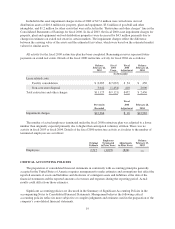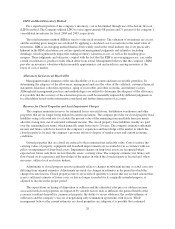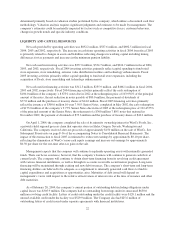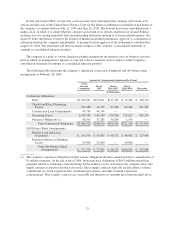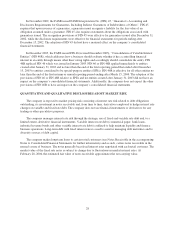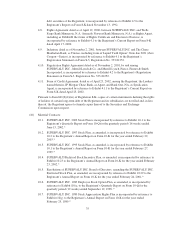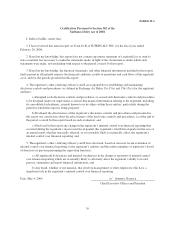Albertsons 2004 Annual Report Download - page 34
Download and view the complete annual report
Please find page 34 of the 2004 Albertsons annual report below. You can navigate through the pages in the report by either clicking on the pages listed below, or by using the keyword search tool below to find specific information within the annual report.
The table below provides information about the company’s financial instruments that are sensitive to
changes in interest rates, including notes receivable, debt obligations and interest rate swap agreements. For debt
obligations, the table presents principal cash flows and related weighted average interest rates by expected
maturity dates. For notes receivable, the table presents the expected collection of principal cash flows and
weighted average interest rates by expected maturity dates. For interest rate swap agreements, the table presents
the estimate of the differentials between interest payable and interest receivable under the swap agreements
implied by the yield curve utilized to compute the fair value of the interest rate swaps.
Summary of Financial Instruments
February 28, 2004 Aggregate payments by fiscal year
Fair
Value Total 2005 2006 2007 2008 2009 Thereafter
(in millions, except rates)
Notes receivable
Principal receivable $ 86.5 $ 86.5 $ 25.5 $15.7 $14.3 $15.0 $3.9 $ 12.1
Average Rate receivable 8.6% 8.4% 9.1% 8.9% 9.3% 9.3% 6.9%
Debt with variable interest rates
Principal payable $ 61.1 $ 61.1 $ 1.7 $ 2.6 $ 2.8 $ 1.2 $7.0 $ 45.8
Average variable rate
payable 1.1% 2.2% 1.1% 1.0% 1.0% 1.0% 1.1%
Debt with fixed interest rates
Principal payable $1,473.7 $1,324.2 $272.1 $61.2 $71.2 $ 4.3 $4.5 $910.9
Average fixed rate payable 6.9% 7.7% 8.2% 6.8% 6.8% 8.3% 6.7%
Fixed-to-variable interest rate
swaps
Amount receivable $ 20.5 $ 20.5 $ 8.2 $ 6.2 $ 4.1 $ 1.0 $1.0
Average variable rate
payable 3.7%
Average fixed rate
receivable 7.9%
Cautionary Statements for Purposes of the Safe Harbor Provisions of the Securities Litigation Reform Act
Any statements contained in this report regarding the outlook for our businesses and their respective markets,
such as projections of future performance, statements of our plans and objectives, forecasts of market trends and
other matters, are forward-looking statements based on our assumptions and beliefs. Such statements may be
identified by such words or phrases as “will likely result,” “are expected to,” “will continue,” “outlook,” “will
benefit,” “is anticipated,” “estimate,” “project,” “management believes” or similar expressions. These forward-
looking statements are subject to certain risks and uncertainties that could cause actual results to differ materially
from those discussed in such statements and no assurance can be given that the results in any forward-looking
statement will be achieved. For these statements, the company claims the protection of the safe harbor for forward-
looking statements contained in the Private Securities Litigation Reform Act of 1995. Any forward-looking
statement speaks only as of the date on which it is made, and we disclaim any obligation to subsequently revise any
forward-looking statement to reflect events or circumstances after such date or to reflect the occurrence of
anticipated or unanticipated events.
The following is a summary of certain factors, the results of which could cause our future results to differ
materially from those expressed or implied in any forward-looking statements contained in this report. These
factors are in addition to any other cautionary statements, written or oral, which may be made or referred to in
connection with any such forward-looking statement; however, they should not be construed as exhaustive.
‰Economic Conditions. The food industry is sensitive to a number of economic conditions such as:
(i) food price deflation or inflation, (ii) softness in local and national economies, (iii) increases in
29


